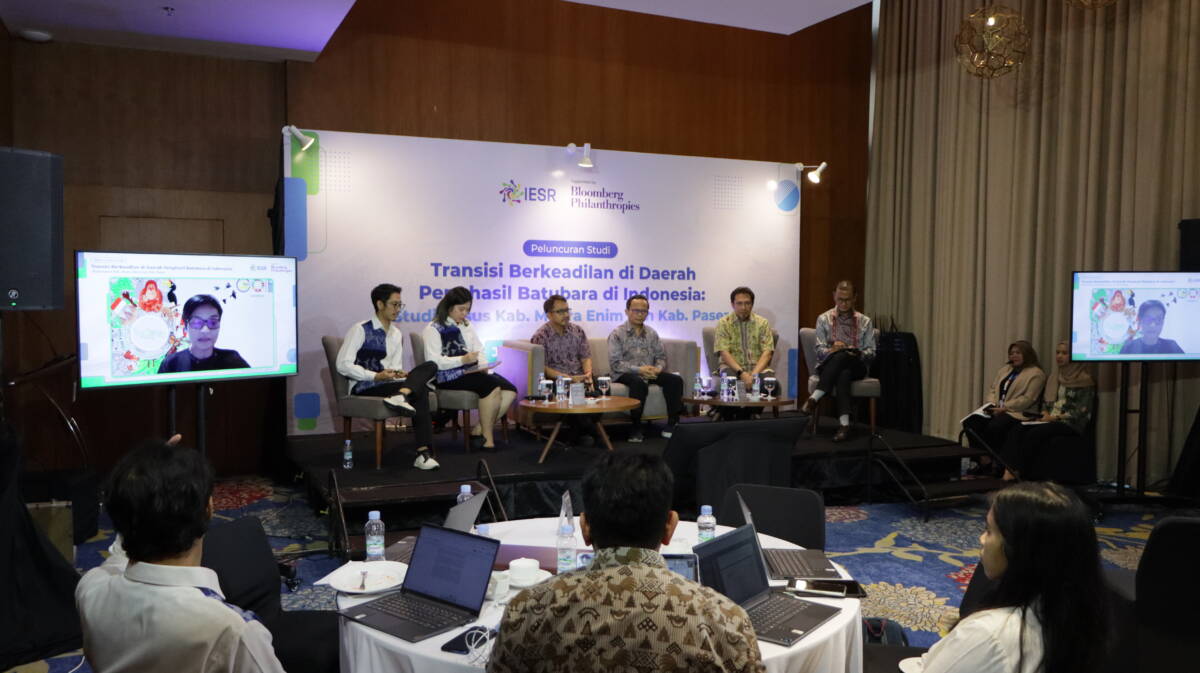Jakarta, 1 September 2023 – In 2022, Indonesia will be the third largest coal producing country in the world. This has had a number of good and bad impacts on Indonesia, especially coal producing areas, such as Paser Regency in East Kalimantan and Muara Enim Regency in South Sumatra. The coal industry sector directly contributes to Gross Regional Domestic Income (GRDP). The contribution of the coal sector to regional income is quite large. In Paser Regency, East Kalimantan, 70% of GRDP comes from the coal sector. The coal sector also contributes to 20% of the East Kalimantan provincial APBD. Meanwhile, in Muara Enim Regency, the coal industry contributes to 50% of the GRDP and 20% of the APBD of South Sumatra Province.
Julius Christian, Research Manager of the Institute for Essential Services Reform (IESR), explained that the downward trend in global coal use and demand will accelerate in line with the increasing climate commitments of Indonesian coal export destination countries such as China, India and Vietnam.
“If these countries increase their climate commitments to be compatible with the Paris Agreement targets, there will be a drastic reduction in Indonesian coal. “This will certainly have an economic and social impact on Indonesia’s coal producing regions,” said Julius.
Economic dependence on this one sector has become a concern for local governments. This was explained at the launch of the IESR Study entitled “Just Transition in Coal Producing Regions” (1/9). IESR Social and Economic Analyst, Martha Jesica, said that coal producing regional governments sometimes do not understand the risks of the energy transition. However, they understand that economic dependence on one sector is not good.
“As an effort to get out of this dependency, the regional government is supporting the company’s CSR initiatives and starting to identify opportunities for economic diversification,” explained Martha.
Ilham Surya, IESR Environmental Policy Analyst, added that preparing human resource capacity is an important point in making a just transition.
“Considering that there will be changes from economic sectors that are familiar to them, such as mining, towards clean energy, there needs to be capacity building which includes education (including) financial literacy and health quality,” he added.
Differences in education levels are one of the reasons why local communities in coal-producing areas can only access work at the sub-contractor level. In the response session, Dedi Rustandi, Intermediate Expert Planner, Coordinator of Renewable Energy and Energy Conservation at the Ministry of National Development Planning/Bappenas, conveyed the importance of preparing society for the transition. “Energy transition is an inevitability. Now is the right moment to increase public awareness of the energy transition issue. Our coal reserves actually don’t have that much anymore.”
On the same occasion, Aris Munandar, Young Expert Policy Analyst, Sub-Coordinator 1, Directorate General of Regional Development, Ministry of Home Affairs, added that the energy transition in coal-producing areas is not only related to the ESDM sector. “We will support it through the RPJMD (Regional Medium-Term Development Planning). The regional vision will be very important to include in these strategic documents because 2024 will be a political year.
“Regional heads must be thorough in seeing what things must be included in the RPJMD,” he added.
Verania Andria, as Senior Adviser for Renewable Energy Strategic Program UNDP/Chair of JETP Indonesia’s Just Transition Working Group, believes that there are a number of things that need to be considered in the coal transition process, one of which is economic diversification.
“The important thing to pay attention to in this economic diversification is related to financial sources that must continue to be explored, we cannot just depend on CSR funds from coal companies (as was the study’s findings),” he said.
The same thing was also expressed by Uka Wikarya, Head of Regional and Energy Resources Policy Research Group, LPEM UI.
“The quality of human resources really needs to continue to be improved through education and improving the quality of health. “For the economic sector, it is necessary to look for activities or MSMEs that are independent (not dependent for their operations on coal industry activities), so that the interventions carried out can be sustainable,” explained Uka.

